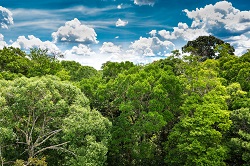Understanding tropical forest behaviour in Earth’s changing climate system
Tropical forests play a key role in the global carbon cycle, harbouring at least half of all species on the planet as well as storing 250 billion tonnes of carbon. This led a team of scientists from 22 countries to examine both the tree diversity and amount of carbon stored in 360 locations across the lowland rainforests of Africa, Asia and the Amazon to determine the exact change and sensitivity of forests to the ongoing challenges of global climate change. The results, published in the journal ‘Scientific Reports’, interestingly reveal that biodiversity in tropical forests does not guarantee more carbon overall. ‘In many ecosystems, sites with more species tend to lock up more carbon. But this doesn't work for tropical forests. Most tropical forests already have many species, and it may be that beyond a certain point adding even more species makes no difference to carbon stocks,’ highlighted co-author, Dr Joey Talbot, from the University of Leeds. In total 200 000 trees were measured in the study using the diameter and identity of every tree within a given hectare (2.5 acres). African tropical forests stored high levels of carbon, but are the least diverse and the Amazon, which has a great diversity of tree species, tends to store less carbon per hectare than forests in Africa and Asia. Nevertheless, protecting biodiverse tropical forests remains essential, both to secure a future for millions of species, and to meet the global commitment of keeping temperature increases well below 2 degrees Celsius. These forests are potentially critically sensitive to climate change, and their fate is closely tied to processes that will affect the rate of global climate change this century. ‘The wonderful diversity of tropical forests, with millions of plant and animal species, is something we rightly celebrate. And now forests face rapidly changing climates, so conserving the full variety of life present could make a critical difference in allowing them to adapt,’ stressed co-author, Professor Oliver Phillips, from the School of Geography at Leeds and leader of the RAINFOR forest monitoring network in the Amazon. Such findings give us an increased global picture of the current condition and trajectory of tropical forests as the climate change threat begins to unfold. ‘It's critically important to keep this carbon out of the atmosphere. But we need to remember that forests are more than just sticks of carbon. Local community uses, species diversity, and the many other values of forests should be taken into account to plan adequate conservation strategies for the 21st century. A simple focus on carbon is never enough,’ warned co-author, Professor Simon Lewis, also from the School of Geography at Leeds and founder of the AfriTRON forest monitoring network in Africa. The T-FORCES project officially ends in June 2017 and aims to deepen our understanding of the role of tropical forests in the global carbon cycle – both present and future. The project received EUR 2 500 000 in ERC funding. For more information, please see: CORDIS project page(opens in new window)
Countries
United Kingdom



